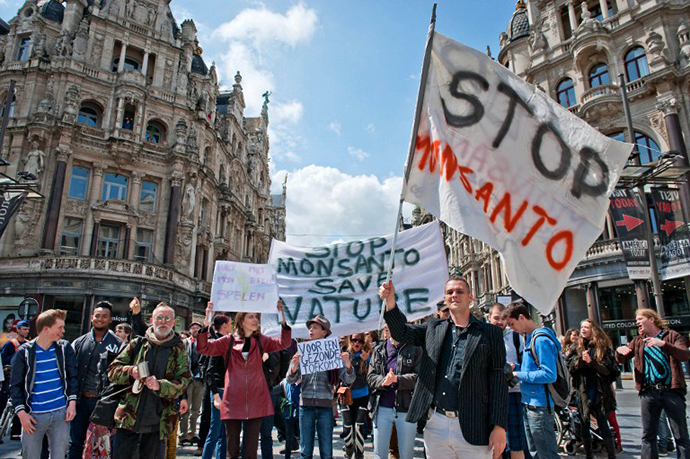William Engdahl
RT
July 26, 2013
 Monsanto will no longer be pursuing approval for the cultivation of new biotech crops in Europe but will instead focus on the import of existing crops. The easing of pressure is tactical, political analyst and author William Engdahl told RT.
Monsanto will no longer be pursuing approval for the cultivation of new biotech crops in Europe but will instead focus on the import of existing crops. The easing of pressure is tactical, political analyst and author William Engdahl told RT.
The world’s largest seed company has been on a losing streak, especially in India and the Philippines. At the end of last week, Monsanto said that it was due to widespread opposition that it dropped its bid to get more genetically modified crops onto the European market – despite using tricks attempting to secure necessary political backing for their success.
RT: Does the decision mean a victory for the anti-GMO movement in Europe?
WE: In a word, no. If you look at the fine print of the interview that the European managing director (MD) for Monsanto, Jose Manuel Madero, gave to Reuters, what he said is that they’re withdrawing a request for new approvals in the EU Commission here in Europe, but at the same time they’re going to increase their pressure to import GMO products from the US and other countries into Europe. So this is a tactical move – it’s not a strategic defeat or rollback by Monsanto in any way shape or…beans.
RT: What are the human and environmental risks?
WE: Well, the Mon810 is primarily being planted in Spain right now and the agri-multinationals have dominated the agriculture in Spain for the last 25 years, so they’ve managed to get a foothold in that country. In most other countries there’s a broad-based grassroots opposition to any and every sort of GMO crop – so they just haven’t been able to do it. In France, you have independent scientists in the universities who have come out with studies of Mon810, showing the indications of severe side effects that weren’t reported by Monsanto. So the popular outcry against that in France, Germany, and other countries is such that Monsanto’s unable to get it pushed through. So what they’re doing is resorting to a back doorway of proliferating their GMO in Europe by increasing the emphasis on imports of GMOs – because there they have a loophole in the European laws of labeling. The power feed – the animal feed that’s GMO corn and soy from Monsanto and other companies – is not required to be labeled as containing GMO.

RT: Monsanto though stressed that this does not mean the firm’s withdrawing its application to renew the approval for its GM corn MON810. What does that tell us about the company’s real intentions?
WE: Well, it’s a pragmatic and tactical move by Monsanto. After Monsanto had a closed-door meeting with the president of the Rockefeller Foundation in 1999, it announced that it was not going to commercialize terminator technology that would have seeds that commit suicide after one harvest, to make sure that farmers would have to come back to Monsanto every year. Seven years later, they acquired the company that had the patent – together with the US government – on terminator or GROTS technology. But by then, the opposition had been disarmed. They thought they’d won a victory. All the anti-GMO NGOs were either sleeping at the switch or looking elsewhere, and there wasn’t a peep of protest. So I suspect they’re trying to do something similar here.
